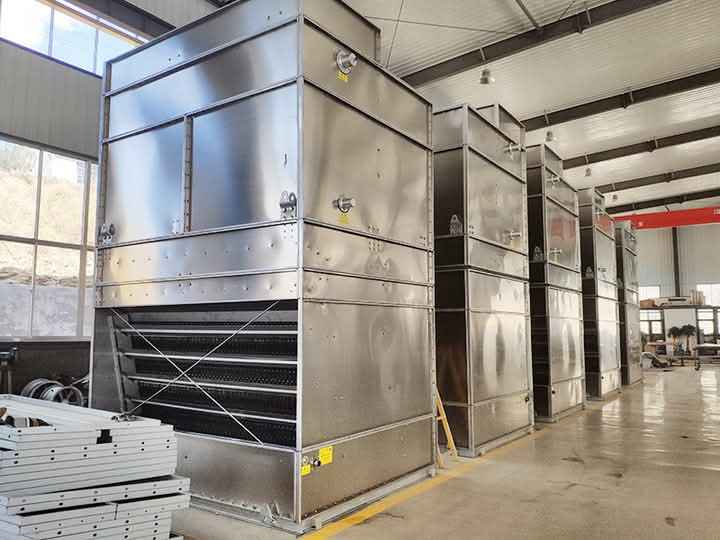Role of Fills in Closed Circuit Cooling Towers (CCCTs)
Unlike open cooling towers, which rely heavily on fills for heat exchange, Closed Circuit Cooling Towers (CCCTs) primarily use heat exchanger coils to cool the process fluid in a closed loop. However, some advanced CCCT designs incorporate fills (also called adiabatic pads or pre-cooling media) to enhance performance under specific conditions.
1. Primary Role of Fills in CCCTs
Since CCCTs are closed-loop systems, fills are not used for direct heat transfer like in open towers. Instead, their roles include:
A. Adiabatic Pre-Cooling (Evaporative Assist Mode)
- How it Works:
- A secondary water spray wets the fill/media.
- Hot ambient air passes through the wet fill, cooling via evaporation before reaching the coil.
- This pre-cool the air, improving heat rejection efficiency.
- Benefit:
- Reduces coil temperature without direct water contact with the process fluid.
- Lowers energy consumption in hot/dry climates.
B. Hybrid Cooling (Dry + Wet Operation)
- Dry Mode:
- No water spray → Air cools the coil directly (like a dry cooler).
- Wet/Adiabatic Mode:
- Fill is wetted → Evaporative cooling enhances performance.
- Benefit:
- Saves water (only uses spray when needed).
- Extends operational range in varying climates.
C. Dust & Debris Filtration
- Some fills act as air scrubbers, trapping particulates before they reach the coil.
- Benefit:
- Reduces fouling risk on the heat exchanger.
2. Types of Fills Used in CCCTs
| Type of Fill | Material | Function | Best For |
| Adiabatic Pads (Evaporative Media) | Cellulose, PVC, or Corrugated Plastic | Pre-cools air via evaporation | Hot & dry climates |
| Film Fill (Limited Use in CCCTs) | PVC or Polypropylene | Rarely used; only in hybrid designs | High-efficiency cooling |
| Splash Fill (Rare in CCCTs) | PVC Bars | Breaks water into droplets | Older hybrid systems |
| No Fill (Dry Mode Only) | – | Only coil-based cooling | Water-scarce regions |
